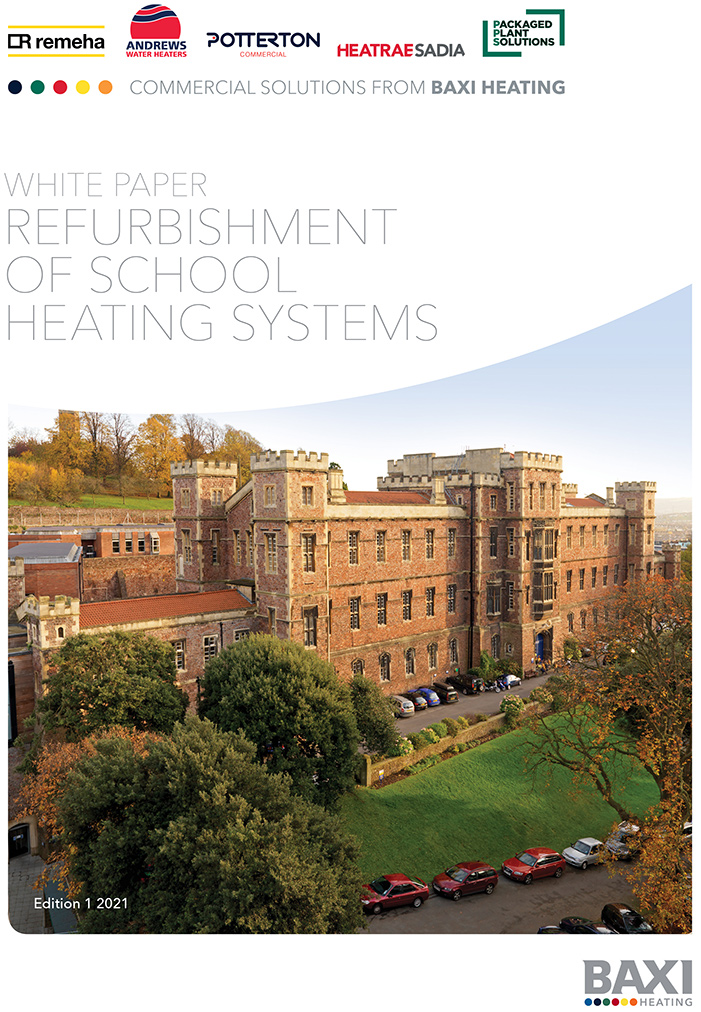Baxi Heating Releases White Paper On Need For UK School Heating Refurbishment To Set Buildings On The Path To Net Zero
 Taking immediate action to refurbish ageing school heating systems is vital to put ‘hard‑to‑tackle’ educational buildings on the road to the future of heating, according to a new report by Baxi Heating.
Taking immediate action to refurbish ageing school heating systems is vital to put ‘hard‑to‑tackle’ educational buildings on the road to the future of heating, according to a new report by Baxi Heating.
The ‘Refurbishment of School Heating Systems’ white paper comes on the heels of the UK government’s announcement that it will legislate a new target to reduce emissions by 78% by 2035, as part of a new Sixth Carbon Budget.
The report:
- identifies drivers for improvement
- encourages holistic systems thinking
- outlines the benefits of modern heating technologies and techniques
- aims to deliver optimal efficiencies for improved outcomes and progress towards net zero.
The urgent need to reduce emissions from heat in UK buildings is particularly pressing in the education sector. Many of our schools are ageing and their heating and hot water systems have seen better days. The report reveals that around 65% of school buildings were constructed before 1976, 46% were built before 1966 and the rate of new school construction is low. The existing stock will therefore continue to overshadow the sector for many years to come.
The UK government has recognised the issues with a ten‑year school rebuilding programme. It has also included schools in the Public Sector Decarbonisation Scheme to help them install energy efficiency and low carbon heating measures.
But schools embarking on a heating refurbishment programme often face a range of challenges – from poor insulation to overheating – that make use of some alternative technologies very difficult.
Andy Green, Technical Director at Baxi Heating, who contributed to the report, said:
“For many schools, switching from ageing non‑condensing boilers to low carbon technologies in one leap simply won’t be a technically or financially viable option at present.
“However, it’s evident that if we are to achieve our emissions reduction target, we must take every possible action now. In schools like these, we recommend taking a phased approach to refurbishment to bring the building up to code and set it on the path to net zero.”
The white paper reveals that 57% of England’s schools have faulty boilers or heaters that add an unnecessary financial burden for this sector. The Carbon Trust Whole School Approach to Energy Savings report estimates that UK schools could save £60 million annually through improved energy management, including upgraded heating and hot water systems – often the most significant energy users in school buildings.
Andy Green continues: “We mustn’t neglect the affordable and achievable opportunities to reduce energy costs and emissions. Replacing old heating plant with modern energy‑efficient condensing boiler technology, for example, can drive down energy consumption significantly – and will provide an immediate solution for schools that face inadequate heating and hot water provision.”
The report aims to deliver better outcomes for students and teachers, with reduced operational costs, through a focus on systems thinking from design to installation – and to make important strides towards the UK’s emissions reduction target.
“Adopting a holistic approach to system design and exploring modern technologies and techniques is key to resolving a school’s unique heating and hot water requirements,” Andy adds.
“Refurbishing school heating systems as soon as possible will put these buildings on the road to the future of heating,” he concludes. “That might ultimately mean a shift to heat pumps, smart electric water heating equipment, or hydrogen boilers. Whatever the appropriate technology of the future for the individual building, progress will be much easier to achieve if firm foundations are laid now.”
The ‘Refurbishment of School Heating Systems’ white paper is available for free download from: www.baxiheating.co.uk/schools.



























































